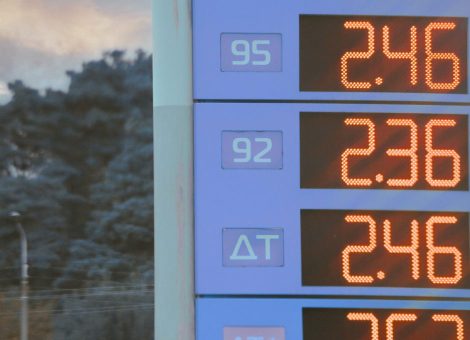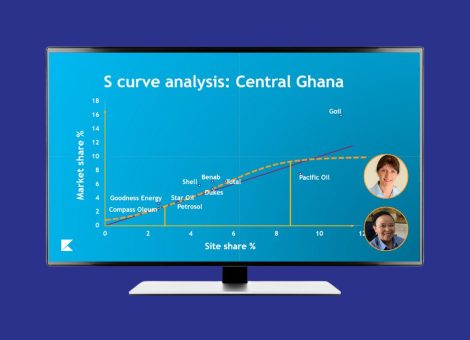Meet the Kalibrate team: Dave McKerral, Director of Product Development
At Kalibrate, we believe our success is driven as much by our people as our technology.
Our meet the team series showcases some of the talent and expertise within the Kalibrate family and this installment features Dave McKerral, Director of Product Development.
What’s your role at Kalibrate?
My role at Kalibrate is Director of Product Development within the fuel sector. This includes working on development for both Kalibrate Pricing and Kalibrate Planning.
The chances are that if you’re an existing or prospective customer of Kalibrate, a member of my team will have developed the product and will refine the service over the course of its development. I will monitor the progress of a project and delegate tasks to my team, seeking constant feedback from stakeholders such as Product Management and Customer Success.
My team is made up of twenty-five IT development specialists, and consists of developers, testers, data engineers, and product owners. There is a huge amount of experience within the team ranging from those who have worked at Kalibrate for over twenty years and others who are straight out of university.
Prior to working at Kalibrate, I was Chief Technology Officer at a Fintech start-up, I have brought my experiences of being in a start-up culture into my team as there are clear synergies between Kalibrate’s rate of growth through the recent acquisitions and our own product development.
Across the whole team, everyone is engaged and feels ownership for the product that we’re delivering to the customer.
What does a typical day look like?
The Development team continues to adopt a hybrid approach to working, and the day kicks off with a Teams meeting for around ten to fifteen minutes to discuss project progress. I like to catch up with the team on a regular basis as a support figure. These meetings are more informal and act as an important social catch-up too.
We still come into the office one day a week for face-to-face meetings and I have a catch-up meeting with the Tech leadership team. Despite the challenges of the past two years, there have been some real benefits in people being able to control their working environments.
Fortunately, all my team have got a good home working set-up, so productivity has been high, and we’ve even been able to have round the clock coverage at times especially with some members of team working back at their family homes over in India and Cambodia due to the various lockdowns and travel restrictions.
The lack of social interaction has been tough though at times, but we have taken steps to remediate this such as doing The Guardian newspaper crossword as a team that has become borderline competitive!
Our focus as a team is on our hosting platform and the appropriate deployment mechanisms. Through quality gatekeeping, our objective is to turn around changes and new developments and get them into the customers hands as rapidly as possible.
I also hold regular meetings with the Product Managers and the Customer Success team, we value their input, and incorporate their feedback within early iterations of the product. Using this approach, multiple departments have an influence on the development journey.
What do you love about your role?
The best thing about my role really is the people. Over the last two years, I’ve been developing my team, and we’ve had some members of the team evolve from Dev Leads to Development Managers.
We’re trying to engage the product owners much earlier in the process and to give them a greater autonomy in the prioritization and order that we develop things. Seeing the growth of our team and working together as a slicker machine is really rewarding. I try to instill within the team that accountability sits with them, and that they’re taking ownership all the way through a project.
In terms of the reception of the products, one of which was completely new capability, gave existing customers better access to their data, and was a rewrite of a legacy product. The reaction from customers to our recent innovations has been overwhelmingly positive.
Friday is my ‘team’s day’, because. I like to be able to go for lunch or go for a drink after work with the team. Pre-Covid, the social atmosphere really helped with our hiring process. Kalibrate’s central Manchester location has a real attraction for great Developers, but not all our team are based here, we have a global team and a real mixture of cultures.
Why did you choose to join Kalibrate?
There were several factors involved in my decision to join Kalibrate, though I think the driving factor was the opportunity to be very development focused.
Having our development and operations functions sitting in parallel structures meant that I could be ultra-focused on getting projects completed. I now feel confident that the quality of the software can stand up to scrutiny from external customers and internal stakeholders.
One area that I am passionate about is the values and how these can be implemented within the wider team. The business targets set by both the CEO and CTO, and the direction that they want to take Kalibrate in the future means that we’ve all got the chance to learn new skills, take ownership of projects, and integrate exciting new technologies, like AI, into our products.
The more we grow as a team, and continue to expand through the acquisitions of TAS, Intalytics, and eSite, this will give people wider opportunities for career development within the business, rather than taking their skills elsewhere.
What do you think are the greatest challenges and opportunities in the fuel and retail sectors?
Due to COVID, fuel price volatility, and the rapid rise of EV adoption, there has been a real focus at Kalibrate on helping our fuel retail customers to adapt their future strategies.
In terms of the technical challenges to help us get there, we need to focus on the infrastructure, on the hosting, and making sure that we’re able to deliver a suite of products with a subset of functionality, that satisfies the changing needs of our customers.
These challenges are being addressed by our intention to move towards being a full SaaS product and to have an offering using the full wealth of experience that my team can offer. We’ve got a genuine opportunity in our development team to work on exciting technologies such as AI or new hosting models.
Another challenge is that our fuel price optimization products cater for wildly different pricing strategies and for different pricing models that adapt to local market conditions. If fuel retailers need to start adjusting their prices on a regular basis, we’ve got to be able to provide systems that alter their prices frequently and with greater accuracy.
Where do you see these markets heading?
I think adapting to trends is the way the fuel market is heading particularly in relation to how the industry responds to widespread adoption of electric vehicles.
Having owned an electric vehicle (EV) for a while now, this summer I decided to make a trip up to the Isle of Skye in Scotland that is roughly double the distance of the battery range of my car.
One notable difference I’ve seen is the varying charging speeds compared to a ‘stop and dash’ of filling up with petrol. Charging needs to be quicker or there must be a space for people to eat or drink whilst plugging in their cars.
We’re already seeing dedicated EV charging stations with coffee shops and improved facilities rather than just having a plastic stand up bar in the corner of the traditional petrol station format.
As an EV owner, the one area that will become a hot topic in the coming years will be the pricing of EV charging, because charging power varies from 7 kW up to 300 kW currently and the price varies from free to 85p/kWh.
It is also expensive to install a charger and there are other considerations such as hooking up to the substation. Companies that install charging points will want to see a return on that investment and will alter prices as a result according to demand.
Personally, I foresee EV pricing becoming very similar to the current petrol and diesel pricing model. Kalibrate will need to create a pricing solution based around EV charging demand, location, and reactive kilowatt pricing models.
There’s a real growth already happening in EV, and we’re already at 200 to 300 miles on a full charge for most cars. If car and battery manufacturers can double the range and half the charge time of batteries, the improved battery technology coupled with a wider choice of places to charge electric vehicles will see adoption rates really take off in the next couple of years.
We all need to be prepared for that.
Read more articles about:
Meet the Kalibrate teamSubscribe and get the latest updates
You may unsubscribe from our mailing list at any time. To understand how and why we process your data, please see our Privacy & Cookies Policy
Related posts
Fuel pricing
Fuel pricing by exception: When do analysts actually analyze?
Managing fuel prices can be time-consuming, especially when analysts spend much of their day on routine tasks....

Fuel pricing
Middle East / Africa - Fuel network planning: Critical insights
Join our team as we look at the key points of insight that fuel network planners need to consider when making...

